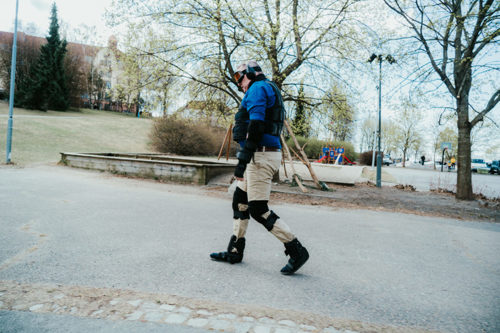How different governments communicated during coronavirus
-
Sist oppdatert
24. februar 2022
-
Kategori
-
Tema
- Health
- Communication
- Covid19
Poor communication will significantly undermine national responses to a pandemic.
KNOWLEDGE @ KRISTIANIA: Health communication
In times of crisis, people’s health depends on access to timely, accurate information. Many countries plot a tricky path out of coronavirus ravages, fuelled by different rhetoric from governments.
Thus, an effective communication model that can be used during a crisis or epidemic became more vital as it can enable leaders to navigate the harsh realities and save lives. Such a communication model can be found in many speeches given during this historical event to be used as a strategy during the next health crisis.
A closer look at the government’s rhetoric
In my Ph.D. project on the "Leadership Communication Styles of Country Leaders in Times of Crisis", I review and evaluate the authorities' communication handling the outbreak. I explore how the political leaders in the United States of America (US), the United Kingdom (UK), New Zealand and Norway choose their rhetoric and how they frame issues to appeal to a specific audience. To do this, I will use excerpts from speeches given during coronavirus, and compare these selected speeches at a thematic level.
We’ve seen a difference in how the leadership is communicated with the public. In some countries, the interventions were military-like where governments enforced policies restricting movements. In other countries such as Sweden, there were no lockdowns or restrictions on the movement of people. Yet, the difference in response did not result in significant mitigation on the spread of the virus.
Still, all agreed that communication was vital in controlling the COVID-19 infections. The virus spread was hinged on human behavior and the public was in need of being informed.
Did certain communication styles prolonge the crisis?
Ideally, state officials would put political and ideological differences aside in order to concentrate all resources and energy against the threat. Such a coordinated response would be essential in the case of a new, highly infectious disease that has no treatment, vaccine, or cure at the time such as COVID-19.
The widening gap we witnessed in some countries begs the question of whether the crisis communication style of leaders has prolonged the pandemic and ultimately endangered the resilience by politicizing the response.
Split messaging and divisions exacerbated the threat
Before the declaration of the pandemic, the US and the UK were the best prepared countries out of 195 nations, according to reports published by the John Hopkins Center for Health Security. Yet, some senior government officials in the UK were forced to resign due to failing to maintain a consistent public health message. Thus, the public lost trust in their leadership.
In the US, health officials urged people to use face covering, while President Trump refused to do so and argued against. The credibility gap between him and experienced government officials, including the health experts who are part of his COVID-19 task force widens. The split message regarding masks and the subsequent political divide over them has come to symbolize the chaos of the U.S. response to the raging pandemic.
“United we stand”
On the contrary, despite the lack of preparedness, Norway arguably performed well in handling the pandemic quickly and effectively. The government succeeded in the successful collaboration in decision-making with health experts.
Former Prime Minister Erna Solberg sent an invitation to work together and share the responsibility "In Norway, we stand together when it comes to. We mobilize for volunteer work and collaboration in small and large local communities. Now this is more important than ever".
Similarly, in New Zealand the government achieved remarkable success in managing the pandemic. Health authorities as well as the political leadership communicated the same strategies and understanding of the pandemic. The positive and consistent messaging inspires confidence and social solidarity.
Poor communication can worsen the effects of the crisis
In our interpretation, no matter how effective the planned response is, poor communication will significantly undermine national response to a pandemic. In fact, it can exacerbate the threat and lead to greater disease effects as well as a loss of trust and faith in leaders.
A closer look into speeches at a thematic level would provide an idea about the political leaders' rhetoric. Also, it will allow us to understand different rhetorical strategies used by leaders on both sides of the aisle and how they frame issues to appeal to a specific audience.
Kristiania University College funds the research project, Adnan Kisa is the project leader, and Jens Kjeldsen from the University of Bergen is the main supervisor.
References:
- GHS Index. (2019). The Global Health Security Index-Reports & model 2019. Retrieved September 29, 2020 from https://www.ghsindex.org/
- Nicola, M., Sohrabi, C., Mathew, G., Kerwan, A., Al-Jabir, A., Griffin, M., Agha, M., & Agha, R. (2020). Health policy and leadership models during the COVID-19 pandemic-review article. International Journal of Surgery.
- The Washington Post. (2020). How the split over masks sums up America’s chaotic coronavirus response. Retrieved October 2, 2021.
Text: PHD-fellow Magde Mohamed Nour, School of Health Sciences at Kristiania University College
We love hearing from you:
Send your comments and questions regarding this article by E-mail to kunnskap@kristiania.no.
N

How blockchain technology can enhance trust in social business
Blockchain technology can be applied to enhance transparency and accountability in social business operations and thus lead to trust.Les mer
Consumers expect brands to take a stance on key issues
Managers cannot not take a stance on key issues. Consumers and other stakeholders increasingly expect brands to take a lead on sociopolitical issues.Les mer
N2

Understanding the business opportunities of Extended Reality
Extended Reality (XR) is becoming an increasingly hot topic in research, business, and in our everyday lives.Les mer
Applying empathy as a tool for innovative thinking
Empathy can be applied as a tool in finding innovative ways to live and age at home for as many as possible with as much dignity as possible.Les mer




